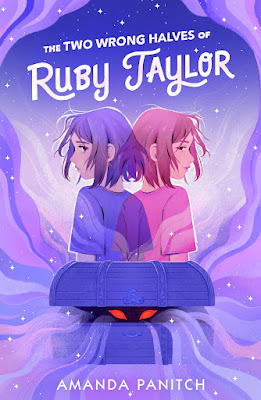Review: The Two Wrong Halves of Ruby Taylor
The Two Wrong Halves of Ruby Taylor
by Amanda Panitch
Roaring Brook Press (imprint of Macmillan), 2022
Category: Middle Grade
Reviewer: Beth L. Gallego
Buy at Bookshop.org
Ruby Taylor’s father is Jewish, and her mother is Catholic. To her paternal grandmother, Ruby is not really a Jew. Grandma Yvette blatantly favors Ruby’s four-months-older cousin Sarah who, in addition to being the sort of tidy, polite, and helpful girl adults adore, has a Jewish mother. Afternoons at their grandmother’s house see Sarah cozy in the kitchen, learning to cook, while Ruby is banished to the living room with her homework. There is a growing distance between the once-close cousins, and Ruby might not be all that interested in closing it. Maybe it is just time for the two of them to make new friends and pursue different activities.
Then Sarah starts behaving strangely, acting out in ways that are downright dangerous. Ruby thinks she knows why, and it might be a little bit her fault. Possibly, she accidentally released a dybbuk, which has possessed Sarah. Ruby is the only one who recognizes what is happening, but her research (mostly searching the Internet on her phone) says that only a “pious Jew” can drive out a dybbuk. With her grandmother’s doubts nagging at her, how is Ruby supposed to defeat an angry spirit bent on revenge?
Questions of identity are central to Panitch’s novel. Grandma Yvette seems to believe Sarah is destined to be the perfect Jewish wife and mother, but she doesn’t respect Sarah’s desire to study Torah instead of baking cookies. While Ruby is not Jewish enough for her paternal grandmother, she is too Jewish for her mother’s family. When Ruby complains about being “just half and half, and somehow both halves are wrong,” her new friend Aubrey Liu drives home the point: “I don’t have to be half-Jewish and half-Chinese. No, I’m Jewish and Chinese. You can be two whole things at one time.”
Occasionally, the narrative becomes exposition-heavy before ramping up the action and emotions on the page. The supernatural aspect is kept ambiguous for a while - is Sarah really possessed? As a whole, the book is humorous and touching, filled with authentic angst about family frictions and changing friendships, focusing these universal themes on a specific - and specifically Jewish - experience.
Are you interested in reviewing books for The Sydney Taylor Shmooze? Click here!
Reviewer Beth L. Gallego grew up outside Chicago, earned her Master’s degree in Library and Information Science at the University of Illinois, and promptly moved to sunny Southern California, where she has been a Librarian since 2002.
Ruby Taylor’s father is Jewish, and her mother is Catholic. To her paternal grandmother, Ruby is not really a Jew. Grandma Yvette blatantly favors Ruby’s four-months-older cousin Sarah who, in addition to being the sort of tidy, polite, and helpful girl adults adore, has a Jewish mother. Afternoons at their grandmother’s house see Sarah cozy in the kitchen, learning to cook, while Ruby is banished to the living room with her homework. There is a growing distance between the once-close cousins, and Ruby might not be all that interested in closing it. Maybe it is just time for the two of them to make new friends and pursue different activities.
Then Sarah starts behaving strangely, acting out in ways that are downright dangerous. Ruby thinks she knows why, and it might be a little bit her fault. Possibly, she accidentally released a dybbuk, which has possessed Sarah. Ruby is the only one who recognizes what is happening, but her research (mostly searching the Internet on her phone) says that only a “pious Jew” can drive out a dybbuk. With her grandmother’s doubts nagging at her, how is Ruby supposed to defeat an angry spirit bent on revenge?
Questions of identity are central to Panitch’s novel. Grandma Yvette seems to believe Sarah is destined to be the perfect Jewish wife and mother, but she doesn’t respect Sarah’s desire to study Torah instead of baking cookies. While Ruby is not Jewish enough for her paternal grandmother, she is too Jewish for her mother’s family. When Ruby complains about being “just half and half, and somehow both halves are wrong,” her new friend Aubrey Liu drives home the point: “I don’t have to be half-Jewish and half-Chinese. No, I’m Jewish and Chinese. You can be two whole things at one time.”
Occasionally, the narrative becomes exposition-heavy before ramping up the action and emotions on the page. The supernatural aspect is kept ambiguous for a while - is Sarah really possessed? As a whole, the book is humorous and touching, filled with authentic angst about family frictions and changing friendships, focusing these universal themes on a specific - and specifically Jewish - experience.
Are you interested in reviewing books for The Sydney Taylor Shmooze? Click here!
Reviewer Beth L. Gallego grew up outside Chicago, earned her Master’s degree in Library and Information Science at the University of Illinois, and promptly moved to sunny Southern California, where she has been a Librarian since 2002.



Comments
Post a Comment